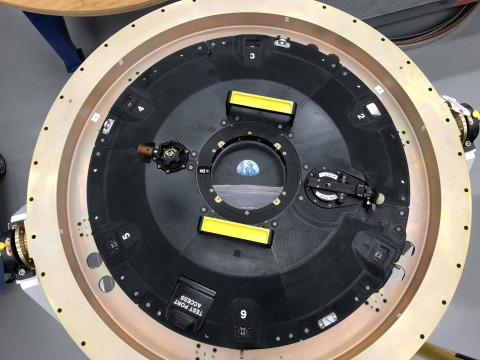Stratasys 3D printers and materials provide extremely high levels of strength, durability and thermal properties to power missions to deep space
Variant of new Stratasys Antero™ 800NA, PEKK-based material offers electro-static dissipative (ESD) functionality for advanced mechanical, chemical, and thermal properties
MINNEAPOLIS & REHOVOT, Israel & TEMPE, Ariz. — (BUSINESS WIRE) — April 17, 2018 — Stratasys Ltd. (NASDAQ: SSYS), a global leader in applied additive technology solutions, and Phoenix Analysis & Design Technologies, Inc. (PADT) jointly announced the companies are teaming with Lockheed Martin Space to deliver next-generation 3D printed parts for NASA’s Orion deep-space spacecraft. Key to the project are Stratasys advanced materials – including an ESD variant of the new Antero™ 800NA, a PEKK-based thermoplastic offering high performance mechanical, chemical, and thermal properties.
This press release features multimedia. View the full release here: https://www.businesswire.com/news/home/20180417005240/en/

The Orion spacecraft leverages a variant of new Stratasys Antero 800NA to build an intricately-connected 3D printed docking hatch door (Photo: Business Wire)
Orion is NASA’s spacecraft that will send astronauts to the Moon and beyond. Orion’s next test flight, dubbed Exploration Mission-1 (EM-1), will be the first integration mission with the world’s most powerful rocket, the Space Launch System, where an un-crewed Orion will fly thousands of miles beyond the Moon during an approximately three week mission.
The following flight, EM-2, will also go near the Moon, but with astronauts on board, a first since 1972 and will enable NASA to prepare for increasingly complex missions in deep space. The mission will use more than 100 3D printed production parts on board, engineered in conjunction with Lockheed Martin, Stratasys and PADT.
The production-grade, thermoplastic 3D printed parts for NASA’s Orion vehicle are produced at the Additive Manufacturing Lab at Lockheed Martin in conjunction with PADT, which now employs the latest in Stratasys 3D printers and materials. Using advanced materials such as ULTEM 9085™ resin and the new Antero material incorporating critical electro-static dissipative (ESD) functionality – NASA could meet key requirements for 3D printed parts to perform in the extremes of deep space. Antero is ideally suited to meet NASA’s requirements for heat and chemical resistance, along with the ability to withstand high mechanical loads.
“Working with PADT, Stratasys, and NASA has enabled us to achieve highly consistent builds that move beyond the realm of prototyping and into production,” said Brian Kaplun, Manager of Additive Manufacturing at Lockheed Martin Space. “We’re not just creating parts, we’re reshaping our production strategy to make spacecraft more affordable and faster to produce.”
The Lockheed Martin, Stratasys and PADT-engineered collaboration is differentiated by an ability to create consistency and repeatability in mass scale across the entire additive manufacturing part production process. Lockheed Martin is also one of the first customers leveraging Stratasys’ Antero, using the new thermoplastic for a critical part situated just outside of Orion’s docking hatch. The complex part consists of six individual 3D printed components locked together to form a ring on the craft’s exterior. The part is currently on display in the Lockheed Martin booth #603 at the 34th Space Symposium in Colorado Springs, CO April 16-19.
“The demands of space travel require extremely high performance materials and the most rigorous manufacturing processes in the industry. Part integrity and repeatability are essential and must pass NASA’s demanding testing and validation process,” said Scott Sevcik, Vice President of Manufacturing at Stratasys. “Based on decades of experience delivering strong and lightweight additive manufacturing solutions for leaders across the aerospace industry, Stratasys technology is ideally suited to match the high-reliability manufacturing processes required for production parts in space exploration.”
“It’s exciting to be a part of the Orion mission and Lockheed Martin’s efforts to transition additive manufacturing from prototyping to production,” said Rey Chu, Principal and Co-Owner at PADT. “Additive manufacturing technology and materials have come a long way to become a full-fledged end-use manufacturing option.”
PADT is currently joining Stratasys in their booth #537 at this week’s 34th Space Symposium. For further detail on how Stratasys is transforming aerospace and space exploration through 3D printing please visit: http://www.stratasys.com/aerospace.
Stratasys is a global leader in applied additive technology
solutions for industries including Aerospace, Automotive, Healthcare,
Consumer Products and Education. For nearly 30 years, a deep and ongoing
focus on customers’ business requirements has fueled purposeful
innovations — 1,200 granted and pending additive technology patents to
date — that create new value across product lifecycle processes, from
design prototypes to manufacturing tools and final production parts. The
Stratasys 3D printing ecosystem of solutions and expertise — advanced
materials; software with voxel level control; precise, repeatable and
reliable FDM and PolyJet 3D printers; application-based expert services;
on-demand parts and industry-defining partnerships — works to ensure
seamless integration into each customer’s evolving workflow. Fulfilling
the real-world potential of additive, Stratasys delivers breakthrough
industry-specific applications that accelerate business processes,
optimize value chains and drive business performance improvements for
thousands of future-ready leaders. Corporate headquarters: Minneapolis,
Minnesota and Rehovot, Israel. Online at:
www.stratasys.com ,
http://blog.stratasys.com and
LinkedIn .








